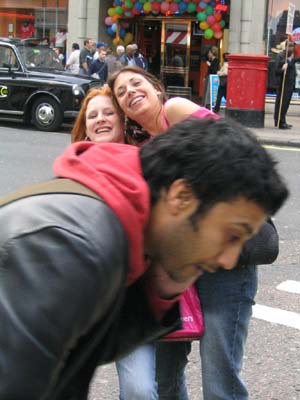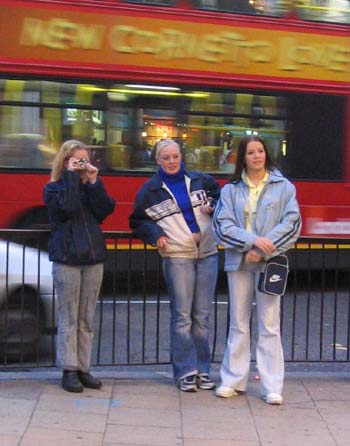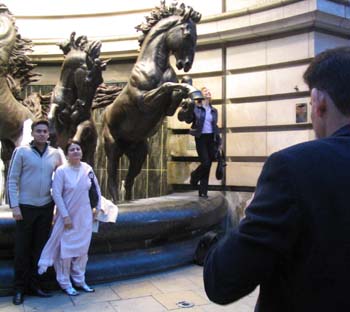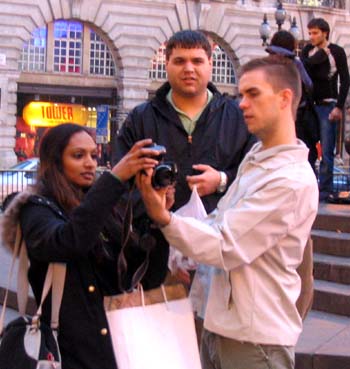We are developing the social individualist meta-context for the future. From the very serious to the extremely frivolous... lets see what is on the mind of the Samizdata people.
Samizdata, derived from Samizdat /n. - a system of clandestine publication of banned literature in the USSR [Russ.,= self-publishing house]
|
This on the midday BBC Radio 4 news:
The Government is resisting pressure from the European Union to introduce random breath tests.
Yes, my ears did not deceive me. Here is the story in writing:
Police should carry out random breath tests as a matter of course, according to the European Commission.
Under existing laws, UK police can only carry out a breath test if they believe the driver has been drinking.
But the European Commission wants all member states to allow its police to carry out random tests.
The Home Office said introducing random testing was “inefficient in catching drink-drive offenders.”
Whenever the British Government describes itself as resisting pressure from the European Union, it is a good bet that this pressure will in due course be succumbed to.
“As the great German philosopher Fred Neechy once said: That which does not kill us is gonna wish it had because we’re about to FedEx its sorry ass back to Skank Central where it came from. Or something like that.”
– The words of Starla Grady (played by Jane McGregor) in the opening credits of Slap Her… She’s French
Ben Hammersley has put a bounty on Kofi Annan’s head.
Annan is an object of undeserved worship, and the way to treat objects of undeserved worship is to blow raspberries at them. This Bounty Bar makes a fine raspberry. I make that three incompatible metaphors. Salutations to Photoshop, and to Normblog for the link.
I’m watching Robert Kilroy-Silk on Question Time, and I think he’s doing rather well.
Kilroy started out as a Labour MP, believe it or not. But he was never really convincing in the role. The others did not like him, and he sensed that he was not one of them, was my impression. Too keen on personal advancement, and not nearly keen enough on concealing it under a veneer of class solidarity. So he stopped doing that and switched to Kilroy, one of those early to mid-morning mini-amphitheatre televised bore-ins with Kilroy himself as the roving interlocutor.
Kilroy’s basic problem with Kilroy was that he seemed to regard everyone present except himself an idiot, a feeling which must have been hard to fight, given that everyone present except himself was at the very least behaving idiotically. (I speak as one who used to appear on this show myself from time to time, until I saw the pointlessness of my ways.) Kilroy tried to conceal his contempt for everyone under a layer of somewhat overdone good humour and what I presume he thought was charm, but what everyone else called smarm.
As his show moved away from semi-intelligent debate into the territory already occupied more entertainingly by Jerry Springer – my mother is a cross-dresser, I want to have a fight with my step-dad, my twin sister is a prostitute and I am a nun and I want to have a fight with her, etc. – Kilroy’s manner became ever more off-putting and false and desperate.
But Kilroy-Silk’s manner on Question Time was downright … appropriate. Gone was the layer of smarm. And out from under it came this really quite attractive and intelligent man. He used to be hated because he was appalling. Now he will be hated because he is not nearly as appalling as his enemies would like him to be.
Most of us are familiar with the Peter Principle, the one that says that people are promoted until they arrive with a thud at their level of incompetence, at which they then remain for ever. But in politics as in life generally, I think we sometimes observe the opposite process. Sometimes, people arrive at their level of competence, having just buggered about pointlessly for the previous two decades until they reached it. Kilroy-Silk strikes me as a fine example of a man who is now, as a Eurosceptic politician with the right, the duty, and the inclination to speak his mind, at last arriving at his level of competence.
It could turn out that by switching off Kilroy the talkshow host, and unleashing Kilroy-Silk the reborn politician, the BBC has made one of its most important contributions to the EUro-debate, in favour of the NO side.
Please understand that I am talking here about competence, rather than about the rights and wrongs of it all. I generally hate what politicians do, but my point is: some of them do it very well, while others mysteriously run out of steam, seem woefully miscast, and should have carried on with what they had previously been doing.
For the opposite tendency, a perfect example of the original Peter Principle rather than of the reverse version of it which I am here offering: Glenda Jackson. What a fine actress. And what a sad, drab failure as a politician.
Something rather remarkable has just happened. I am watching Baddiel and Skinner Unplanned, and they have just had a serious discussion about how they really did not like the fact that the Government can tell exactly which internet sites you have just been visiting, and read all your emails, and send you to prison if you encrypt them and do not tell them the key, or whatever it is. Baddiel and Skinner never have serious discussions.
A bloke in a beard (of the trimmed sort rather than ZZ Top style) asked a question about this, and instead of him being laughed out of the studio, they found themselves discussing it quite seriously. Bearded bloke was allowed to add a further comment (about the emails). Baddiel in particular seemed quite upset.
Interesting.
We never saw this coming, did we?
The Government signalled yesterday that it was willing to breach the first of its “red line” safeguards on the European constitution by agreeing to cede Britain’s veto over sensitive areas of criminal justice.
The shift in policy raises fears that Brussels could acquire the power to interfere with the common law tradition of habeas corpus, trial by jury, and rules of evidence.
Whereas, until today, nobody had ever thought that possible.
I remember once defining “compromise” as you doing something I want, and in exchange me doing something else I want. Which makes me a bit like the EU. What a horrible thought. Eeeeuuuu!!!
No question about the big story in London today. Some idiots seeking to draw attention to their cause (which – oh dear oh deary me – I seem to have quite forgotten although I was told) by chucking some contraceptives full of chalk dust at the Prime Minister during Prime Minister’s Questions.
If this dust had been scarily biological – anthrax or some such thing – then the subsequent behaviour of the assembled MPs was the exact opposite of what it should have been. Instead of remaining in situ to be cleansed by the cleansing squads, they immediately fled the chamber, which would have spread the contagion to the rest of us. There has to be a political metaphor there somewhere.
But fair play to them, our real ‘security system’ is not what we all do to prevent a disaster being disastrous; it is that once things have calmed down a bit, we chase after whoever did it and make life hell for them, and damn the expense. (Compare: 9/11.)
The usual protestations erupted today to the effect that “this must never be allowed to happen again”, thus proving that when stressed, MPs are just as foolish as Trailor Trash on the Jerry Springer show when facing similar mishaps, and just as keen on Total Safety as anybody else and just as doomed not to get it as everybody else. These things happen. The stupid people who did this will be chased down and made to wish that they had refrained. They will not be punished nearly as severely as they would have been if it really had been anthrax, but it will still be pretty frightening for them. If they did not see this coming, they are very stupid and deserve to be badly frightened anyway.
The idea that disasters are, on the whole, deterred rather than straightforwardly prevented, is, I think, a very fruitful one, with applications (again: 9/11) way beyond this one rather farcical episode.
None of which means that there will not now be a frighteningly expensive security panic centred on the House of Commons. New barriers will be erected. New badge systems to restrict access to the place will be devised, at a huge cost in muddle and frayed nerves as well as money. All kinds of restrictions to the manner in which members of the House of Lords invite people to the House of Commons (the problem today apparently) will be conjured up. Again: these things happen. One could no more stop such a process now than stop an earthquake from … quaking. But at the end of it, the world will still be a place in which malevolent or merely mischievous and unimaginative people (today’s culprits) will be able to create havoc if they are of a mind to. They will just have to find a slightly different way to do it.
With the minds of the world’s intervening classes fully occupied elsewhere, Zimbabwe is now a problem too small for those who might otherwise have done something about it to be bothered with, yet still too big and difficult for anyone else to be able to handle. So, Robert Mugabe’s monstrous and murderous political machine will continue to churn its way through what remains of the country and its institutions.
If the anguish of the cricket world serves to draw some of whatever international attention is left over from Iraq to the anguish of Zimbabwe, then so much the better. Personally, I do not give a damn about cricket, or England cricket, or Timbuktooan cricket, as such. Cricket will stagger on, no matter how this Zimbabwe row plays out. But if cricket helps to keep Zimbabwe and its misgovernment in the headlines, then the more and more continuous is cricket’s anguish, the better.
Cricket-wise – and this is the new development in this particular bit of the story – the state of the Zimbabwean cricket team has become so disastrous that even the International Cricket Council has started to worry about it. Until now, the ICC has only been concerned with (a) money, and with (b) making England’s cricket administrators squirm, pretty much for the sheer fun of it (but also because of (a) money), by demanding that England send a touring team to Zimbabwe later this year, no matter what. But now, the Zimbabwe team is such an embarrassment, and the continuing schedule of so-called Test matches between the Zimbabwe also-playeds against Sri Lanka, and soon, even more embarrassingly, Australia (the best cricket team on earth just now), that even the ICC has realised that cricket as a whole is being, as sporting administrators like to say from time to time but usually only when someone cheats, Brought Into Disrepute. ICC administrators are thus inexorably being brought into personal contact with the people who now rule Zimbabwean cricket.
I do not know for sure what is going to happen any more than any one else knows for sure, but here, for what it is worth, is my guess about how events will now unfold. → Continue reading: Cricketing while Zimbabwe starves
Some people do not like having their photos taken by strange strangers… but some love it! These two for example, having a day out in London by the look of it, thoroughly enjoying it, enjoying London and enjoying themselves, and in a state of… mutual support. I took photo number one.
And they said: Oooh! Are you doing us?! Do another one!! So I did.
… and captured another of those characteristic Photography Moments. In the background: the objects of my attention, while in the foreground another Londoner hurries past. Like most people in London he has a purpose. He is going somewhere. He is in too much of a hurry to actually stop, but he is as polite as he can be without seriously interrupting his business and he does not want to get in the way of my business if he can avoid this, so he ducks as he passes. And for once, I get it all: him hurrying and out of focus, and the ladies in focus behind him.
But, one more, eh ladies? And that one comes out okay too. Sometimes everything clicks. Three out of three. This is not my usual hit rate, I can tell you.
These photos are even more entertaining if you look more closely at the label on the red bag:
All hail to the marginal cost (zero – near enough) of digital photography.
Last night I watched the latest episode of Make Me Honest, in which Howard, a night club entrepreneur, completely and totally failed to make Lawrence honest. “Lawrence” is a fat young Jamaican conman, born and raised. (Last week I watched the previous episode in the same series.)
Nevertheless, Howard, for all the fatuous optimism that he brought to the project and to a large degree because of it, did a job on Lawrence and on all the other Lawrences who now infest Britain, and on the present pathetically feeble legal arrangements in Britain that make life so easy for all the Lawrences, that was sweetness itself.
As an exercise in trying to rescue Lawrence from the errors of his ways, it was an abject failure, with ABJECT FAILURE stamped all over it, from day one. It was never going to work. But the last laugh in this saga may not be Lawrence’s, because Lawrence’s true character is now nailed down in video for all the world to see and complain about. Lawrence’s life is probably now about to get a lot more complicated and nasty. In short, the tabloid pack will now be after him. → Continue reading: Howard fails to make Lawrence honest
Nigel Meek, contibuting to the Libertarian Alliance Forum, translates the first paragraph of a Swissinfo news story from its original French, thus:
Hungarian researchers have announced the discovery of a remedy for hay fever. “Rhinolight”, a natural therapy, comprises the direction of “specific light” on the mucous membrane according to specialists at the University of Szeged.
What exactly might “specific light” mean, in this context? And is “Rhinolight” some kind of brand name, or is it a technical term? And: “natural therapy”. In Britain that sounds like: will not work.
But, if this report turns out to be true, I agree with Nigel’s comment:
Hooray!
Indeed. Nigel is a hay fever sufferer himself, as I have so far not been. But I am always pleased about creative, helpful, basically good news stories such as these. The other side, it seems to me, to stories along the lines of “here are some politicians and they have just done/presided over/caused something idiotic/cruel/destructive this” is not: “oh no they haven’t”, or maybe: “well here are some other politicians who are doing better. It is: “well maybe the politicians are making a mess, but there is also good stuff happening in the world being done by quite other people.”
Any comments on this, either from people with better French than me (not very hard), or with better medical science (even easier)? And, is there any news of this that we can read about in English?
UPDATE: Commenter number one reveals that “Rhinolight” is a brand name, and says: here is the link. But the other question still remains: Is this treatment any use?
Well trade here seems to be rather light, so here, given that writing adequately is beyond me just now, are some photos I took earlier. Earlier this evening to be exact. The light was fading fast, but a few of my snaps came out okay.
I like the effect you get when the background is a London bus. Lots of colour, but blurred, and if the figures in the foreground come out well, it can look great.
As you can see, I like to take pictures of people who are taking pictures. Sometimes, as here, I include the people they are photographing. And look, over on the right is a lady posing for another photographer away to the right. I only noticed her after I got home. The horses are a big fountain statue just to the edge of Piccadilly Circus, and are, I think, much more impressive than Eros.
This next bunch of people are doing a characteristic digital camera thing which Real Photographers never do. They are looking together at the picture they have just taken on that little TV type screen that digital cameras mostly now have.
But now here is a shot of London life of a quite different sort. The London Underground is a creeking, groaning, deafeningly loud, hideously crowded … Underground. But they are amazingly quick to put up the posters about any problems they are having.
When I see posters like these, I am part angry, and part impressed. Such a fuck up, and so courteously explained!
I cannot end on this grim note, so here is a happier Underground related picture, this time of a Coca Cola advert done in the lights of Piccadilly Circus, which are supposedly famous, but usually rather feeble, I think. But this was nice. This picture is probably too small, but trust me, it looked very fine.
London. As Doctor Johnson said, if you are tired of London, go to bed and get yourself a good night’s sleep and you will probably feel much better in the morning.
|
Who Are We? The Samizdata people are a bunch of sinister and heavily armed globalist illuminati who seek to infect the entire world with the values of personal liberty and several property. Amongst our many crimes is a sense of humour and the intermittent use of British spelling.
We are also a varied group made up of social individualists, classical liberals, whigs, libertarians, extropians, futurists, ‘Porcupines’, Karl Popper fetishists, recovering neo-conservatives, crazed Ayn Rand worshipers, over-caffeinated Virginia Postrel devotees, witty Frédéric Bastiat wannabes, cypherpunks, minarchists, kritarchists and wild-eyed anarcho-capitalists from Britain, North America, Australia and Europe.
|













